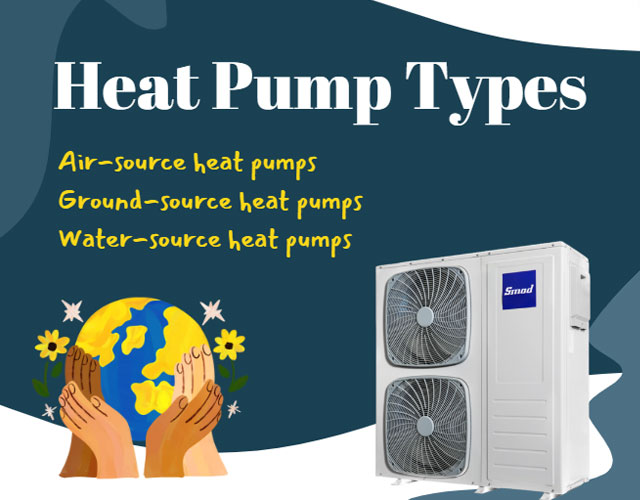2024 Purchase Considerations for Heat Pump : A Comprehensive Guide
The future of home comfort is green. Traditional heating and cooling systems, often powered by fossil fuels, are facing scrutiny due to rising energy costs and environmental concerns. Heat pumps offer a sustainable and cost-effective alternative.
As technology advances, heat pumps are becoming more efficient and versatile. This makes them a great choice for a wider range of homes. But choosing the right heat pump is crucial. This guide will help you navigate the key factors to consider for optimal performance and long-term satisfaction.

I. Understanding Heat Pump Types
Before delving into specific considerations, it's crucial to understand the different types of heat pumps available:
· Air-source heat pumps: These draw heat from the outside air to warm your home in winter and cool it in summer. They are the most common type and generally offer a good balance of cost and efficiency.
· Ground-source heat pumps (geothermal): Utilizing the stable temperature of the earth, these systems provide exceptional efficiency and consistent performance throughout the year. However, they typically require a significant upfront investment.
· Water-source heat pumps: Using water as a heat source or sink, these systems are often used in areas with access to lakes, rivers, or underground water sources. Their performance can vary depending on water temperature and availability.
Each type has its own advantages and drawbacks, making it essential to assess your specific needs and climate conditions to determine the best fit.
II. Key Considerations for Heat Pump Buyers in 2024
As you embark on your heat pump journey, several factors will significantly influence your decision:
· Efficiency Ratings: Look for high Seasonal Energy Efficiency Ratio (SEER) and Heating Seasonal Performance Factor (HSPF) ratings to maximize energy savings and minimize environmental impact.
· Installation and Maintenance: Professional installation is crucial for optimal performance and longevity. Choose a qualified installer who can assess your home's needs and recommend the right heat pump. Regular maintenance is essential for preserving efficiency and extending the system's lifespan.
· Government Incentives and Rebates: Explore available financial incentives, tax credits, or rebates that can offset the initial investment in a heat pump. Contact us to get a free guide for heat pump subsidies.
· Home Compatibility: Assess your home's insulation, ductwork, and electrical system to determine the ideal heat pump size and type. Proper sizing is essential for efficient operation and comfort.
· Environmental Impact: Consider the refrigerant type used in the heat pump. Opt for eco-friendly options with low Global Warming Potential (GWP) to minimize your carbon footprint.
· Cost-Benefit Analysis: Evaluate the initial investment in the heat pump against potential long-term energy savings. Consider factors like energy costs, climate, and your home's specific heating and cooling needs.

Considerations for Installers
For professionals installing heat pumps, additional factors come into play:
· Support Services: Access to comprehensive technical support, training resources, and warranty information is crucial for successful installations and customer satisfaction. SMAD provides dedicated support teams to assist installers at every step.
· Minimum Order Quantity (MOQ) Flexibility: SMAD understands the challenges of stocking a variety of products. Our flexible MOQ allows you to order the exact number of units you need, minimizing inventory costs and risks.
· Diverse Product Range: To cater to different customer preferences and project requirements, SMAD offers a wide range of heat pump models, ensuring you have the right solution for every installation.
By partnering with SMAD, installers gain access to the resources and support needed to excel in the heat pump market. Our commitment to your success is reflected in our flexible business practices and comprehensive product offerings.
III. When to Install a Heat Pump: Timing is Everything
The timing of your heat pump installation can significantly impact your overall experience. Consider these factors:
· Peak Season vs. Off-Peak Season: Installing during the off-peak season (typically spring or fall) can often lead to shorter wait times, better pricing, and potentially more favorable installation conditions.
· Local Climate: Consider your region's climate. If you experience harsh winters, installing a heat pump before the coldest months can ensure you're prepared for the changing seasons.
· Home Preparation: If your home requires additional insulation or ductwork upgrades, planning ahead can streamline the installation process.
By carefully considering these factors, you can optimize the timing of your heat pump installation for maximum benefit.
IV. Making the Right Choice
Choosing the right heat pump involves careful consideration of your home's specific needs, budget, and environmental goals. By understanding the different types of heat pumps, their efficiency ratings, and the factors influencing performance, you can make an informed decision. Consulting with a qualified HVAC professional can also provide valuable insights and recommendations.
Contact us today! By investing in a high-quality heat pump, you're not only improving your home's comfort but also contributing to a more sustainable future.